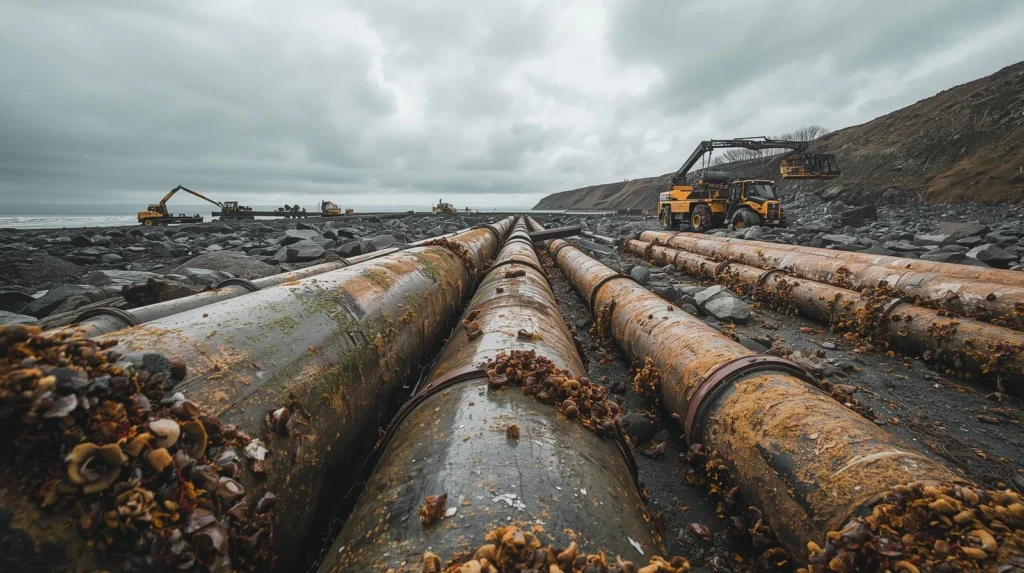Massive Pipeline Incident off the Norfolk Coast
In a remarkable recovery operation, twelve enormous plastic pipes that washed up on the Norfolk coastline have been fully salvaged and sent for recycling in Denmark. These pipes, each measuring an astounding 8 feet (2.4 meters) in diameter, were initially being transported to Algeria when they broke free from their tug boat.
The incident occurred in August when the tug transporting the pipes to a large-scale North African project was struck by a container ship. This collision caused the heavy pipeline segments to detach, with four of them eventually washing ashore between Winterton and Sea Palling. The remaining eight segments stayed at sea, some secured by vessels and others anchored off the Norfolk coast for safety.
Scale and Size of the Pipeline
The pipeline segments were massive in size. Each pipe measured up to 480 meters in length—the equivalent of about four Big Ben towers lined end to end. These enormous segments presented a considerable challenge for recovery teams due to their size, weight, and the unpredictable sea conditions along the Norfolk coast.
Coordination and Salvage Efforts
Recovering the pipes was a complex logistical operation involving more than 30 specialist personnel and companies. Teams worked to stabilize the segments that had come ashore, while others coordinated efforts at sea to secure the remaining sections. Guard ships monitored the offshore pipes to prevent any further drifting or damage to the coastline.
Once recovered, the pipes were transported to Lowestoft, where they were temporarily stored and prepared for shipment. Each segment required careful handling to ensure it remained intact for recycling, as the damaged sections could not be repaired for reuse.
Recycling and Environmental Considerations
The recovered pipes were transported to Denmark for recycling, showcasing a strong commitment to sustainable disposal practices. Although the pipes themselves were manufactured in Norway, the recycling process ensured that the materials were repurposed responsibly rather than discarded as waste. This effort highlights the importance of environmentally conscious management of industrial materials, even after accidental maritime incidents.
Replacement and Ongoing Project in Algeria
The pipeline project in Algeria will continue as planned. New pipes have already been manufactured to replace the ones lost during transit and are expected to arrive in North Africa in December. This swift response ensures that the project schedule remains on track while demonstrating robust contingency planning for industrial logistics.
Lessons Learned from the Incident
This unusual incident serves as a reminder of the challenges involved in transporting massive infrastructure components across the sea. Maritime collisions, even minor ones, can lead to large-scale industrial setbacks. It also highlights the importance of coordinated emergency response, including the use of specialist salvage teams and monitoring ships to prevent environmental hazards.
Furthermore, the incident underscores the importance of recycling and material recovery in industrial projects. Even massive, seemingly unwieldy materials like 480-meter pipeline segments can be repurposed, reducing waste and supporting a circular economy.
Community and Coastal Safety
The pipes washing ashore had the potential to pose hazards to local communities and the coastline. Swift intervention by authorities and the companies involved minimized risks, preventing damage to the Norfolk beaches and ensuring the safety of residents and visitors.
The collaborative response involved maritime agencies, specialized salvage teams, and local logistics support, reflecting how coordinated efforts can efficiently handle even extraordinary incidents.
Conclusion
The successful recovery and recycling of these giant Norwegian pipeline segments from the Norfolk coast demonstrate both industrial resilience and environmental responsibility. While accidents during maritime transport can create significant logistical challenges, careful planning, coordination, and sustainable practices can turn a potential disaster into a managed, positive outcome.
This operation also serves as a case study for the management of large-scale industrial materials, highlighting the importance of preparedness, safety, and recycling practices in complex projects. With the replacement pipes on their way to Algeria, the project continues, and the recovered materials now have a second life through recycling in Denmark.


